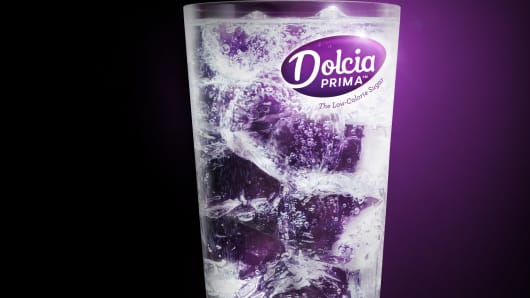Bruce Horovitz
Source: Dolcia Prima Dolcia Prima Allulose. The battle to sweeten food and drinks naturally—but without a lot of calories—got a new jolt Tuesday. Tate & Lyle—the British food ingredient behemoth that supplies Splenda sucralose for Splenda Sweetener maker McNeil Nutritionals — announced the launch of another sweetener product. This one is a sugar with 90% fewer calories than typical table sugar. The product, Dolcia Prima Allulose, is made from corn (no comparison to corn syrup). Carbohydrates from corn go through a special enzyme conversion process to produce the allulose sweetener. Allulose, itself, isn't new. The low-calorie sugar was identified more than 70 years ago and is found in small quantities in everything from figs to raisins. What's new is Tate & Lyle's proprietary process to produce allulose from corn. Sugar, sweeteners and sugar substitutes are a $4.3 billion market in the U.S, estimates researcher Packaged Facts. Tate & Lyle aims to sell Dolce Prima to the big food and beverage makers that are ever eager to cut calories but retain taste. The move comes at a time when consumers are increasingly clamoring for natural sweeteners—even as they demand fewer calories. "We believe that it can do what food and beverage manufacturers have been trying to do for a long time," says Abigail Storms, vice president of platform management and sweeteners at Tate & Lyle. "This is on-trend in terms of providing solutions that are not artificial." But the bigger deal, she says, is calorie reduction. "Calorie reduction is one of the biggest challenges the industry faces," says Storms. One gram of Dolcia Prima has 0.39 calories vs. 4 calories for one gram of table sugar, says Storms. Tate & Lyle has spent more than three years working on Dolcia Prima says Storms, who notes "Dolce" means sweet in Italian; and Prima means "first." The product is sold as a syrup, she says. While there are no immediate plans to sell Dolcia Prima as a table sweetener, "it absolutely could be in the future," Storms says. About 43% of adults say they look for the amount of sugar a product has on its label, says Darren Seifer, food and beverage industry analyst at NPD Group. And an estimated 25% of consumers say they are "cautious" about serving foods and beverages made with sugar vs. 8% who had such concerns in 2000, he says. Dolcia Prima "has the potential to avoid the negative baggage that has grown to accompany low-calorie sweeteners in general," says Tom Vierhile, innovation insights director at DataMonitor Consumer. Many consumers are downright afraid of artificial sweeteners, says Vierhile. Consumers are twice as likely to say they avoid low-calorie sweeteners entirely than they are sugar, he says. About 27.6% of U.S. consumers said they avoid low-calorie sweeteners entirely, vs. just 10.3% that said the same for sugar, according to Datamonitor Consumer's 2013 global consumer survey. Those are fighting words in the world of sweeteners. Especially to beverage behemoths like Coca-Cola and PepsiCo. The soda giants are urgently seeking low-cal sweeteners that are natural and taste good. The industry impact of the new brand has yet to be determined, says John Sicher, publisher of the trade magazine Beverage Digest. "If you can tell me how good it tastes and how much it costs, I can tell you how big a deal it will be."
source : www.cnbc.com |
Paranapanema, SP - Brasil - / Being useful and productive is the aim of every knowledge acquired / - Quod scripsi, scripsi. - Welcome !
quarta-feira, 25 de fevereiro de 2015
Splenda supplier launches 'low-cal sugar'
Assinar:
Postar comentários (Atom)

Nenhum comentário:
Postar um comentário
Observação: somente um membro deste blog pode postar um comentário.